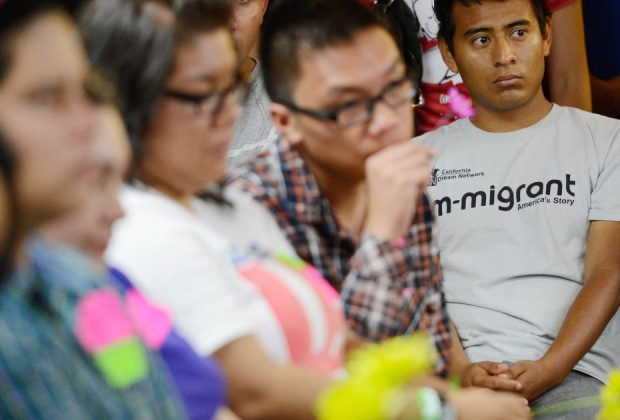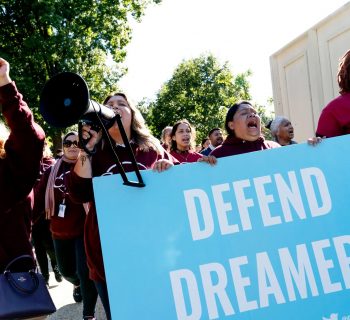By Stacey Arevalo, EGP Staff Writer ~ March 30, 2017
With President Trump’s inauguration came the beginning of an era that has instilled fear and worry amongst the country’s most vulnerable, including undocumented immigrants, and DACA recipients in particular.
Information attained during meetings and psychological sessions conducted at the California-Mexico Dreamers’ Network, for example, strongly suggests DACA recipients living in mixed-status homes are showing increased concern for family members in the country without authorization.
“Since learning about the numerous ICE raids taking place in various parts of the country… students are more afraid and concerned that their parents could be deported at any time than they are of losing their DACA status,” said Lidieth Arévalo, director of multi-media at the California-Mexico Studies Center, Inc (CMSC). The center offers a graduate-level, study-abroad program for young people, commonly referred to as “dreamers.”
Stephanie M. Ryan, supervising attorney at the Central American Resource Center, said she too has seen clients with U.S.-born children or other family members with lawful status who are “afraid about the possibility of their families being split up if DACA is ended.”
“Losing DACA means losing work authorization, and losing work authorization means losing good, secure jobs. The prospect of losing all of that is worrisome.”
The worry is well justified.
Under the federal government’s Deferred Action for Childhood Arrivals program, or DACA, as many as 750,000 undocumented young immigrants brought to the country as children received deportation relief. The program, approved through executive action by former President Barack Obama in 2012, had given work permits and an emotional relief to many that has now faded.
A few weeks after Trump took office the definition of “criminal” as it applies to people in the country illegally was broadened, consequently expanding the deportation priority list for immigration officials.
Under these new rigid policies, even the three-quarters of a million young people with DACA status aren’t exempt, as seen in the Seattle, Washington case of Daniel Ramírez Medina, the first DACA recipient reported to have been arrested and who was detained for more than a month before being released this week pending a future hearing.
“There is increased fear among DACA recipients,” said Arévalo. “Some are willing to take a chance and risk studying abroad under the new administration, but others demonstrate a greater sense of concern, asking us many questions before they decide to apply to our program.”
While Trump’s tough immigration stance has remained unchanged since taking office in January, it is still unclear whether DACA will remain untouched or if he will handle the program “with heart” as he’s previously said.
Angelica Salas is executive director of The Coalition for Humane Immigrant Rights (CHIRLA), an organization that has helped more than 7,700 young people apply or renew their DACA permits. She called the possibility of a repeal “ill-advised” and the basis for chaos.
“We call on the nearly 800,000 young immigrants who have signed up for DACA thus far not to panic, seek verifiable information and guidance from trusted sources, and actively engage in the fight for a permanent solution,” she said in a statement to the press.
This is exactly what Jacqueline Garcia, a Mexican-born DACA recipient since 2012 has done to fight the uncertainty surrounding her.
“I am not one bit scared because I have never committed a crime,” Garcia said. “Also, I am very informed and know what my rights are. I know what I can and cannot say if I’m confronted by an ICE official,” she told EGP.
Garcia advises current beneficiaries of the program to follow the guidelines of proper behavior outlined by the government when you first apply.
“Don’t do things that are obviously violations of moral conduct like driving under the influence,” Garcia said. “For U.S. born citizens a DUI means receiving a ticket, but for DACA recipients it means losing everything.”
Ryan reiterated this and added that it is essential for current recipients to stay up to date with any government announcements and stay out of trouble.
“If you have any prior criminal history (either arrests, charges, or convictions) or if you have had any prior contact with immigration, you should first consult with an experienced immigration attorney or accredited representative before renewing your DACA” permit, Ryan said.
For those who are under the program and wish to travel abroad, CHIRLA’s immigration experts advise against it. According to the organization, under the current political climate, those who leave the country and try to return “are at greater risk to not be allowed back into the U.S.”
Because of the warnings, the California-Mexico Studies Center, Inc. initially 2017 California-Mexico Dreamers Study Abroad Program, but has since decided to go ahead with the program this summer.
“After giving it some thought, and seeing the continuous interest from DACA recipients to study abroad, we decided to take the chance to do what could possibly be the last [trip],” Arévalo said.
Most importantly, however, the consensus between experts is for individuals to stay up to date with new law and immigration policy announcements and to stay alert.
“Don’t be afraid to seek information or to simply talk about the subject with your family members,” Garcia said. “When you avoid talking about subjects like death or immigration, thinking it will bring bad luck, you are just setting yourself up for failure once it happens.”
Source: http://egpnews.com/2017/03/a-time-of-political-uncertainty-for-daca/
Read this article in Spanish here.







